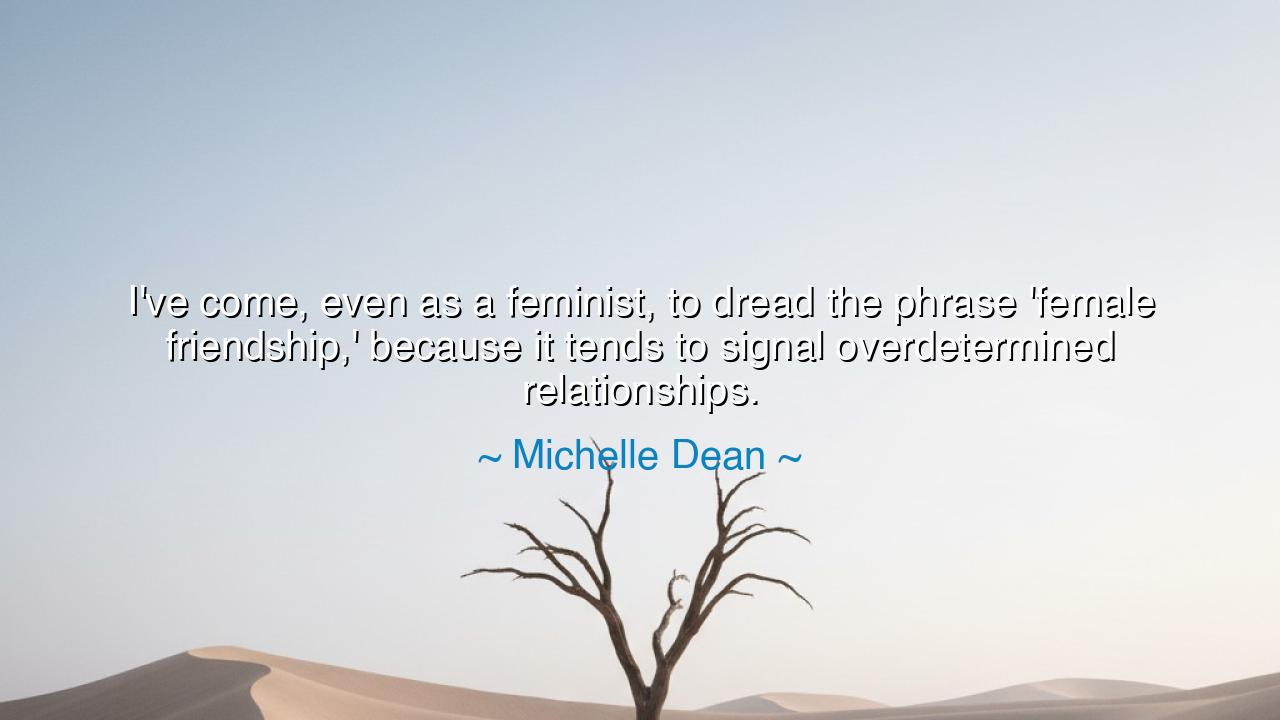
I've come, even as a feminist, to dread the phrase 'female
I've come, even as a feminist, to dread the phrase 'female friendship,' because it tends to signal overdetermined relationships.






The writer and critic Michelle Dean, a voice of intelligence and clarity in modern feminist discourse, once said: “I've come, even as a feminist, to dread the phrase 'female friendship,' because it tends to signal overdetermined relationships.” Though brief, her reflection strikes at the heart of a deep cultural paradox—one that reveals how even the most sacred bonds can be weighed down by expectation and interpretation. Beneath her words lies a cry for authenticity: a longing for friendship between women to exist freely, unburdened by stereotypes or social performance, to be understood not as a symbol or political statement, but as a living, breathing truth between souls.
The meaning of this quote rests in the tension between reality and representation. Dean, as both observer and participant in the feminist movement, acknowledges the beauty and power of women’s relationships—but she also laments how the world has come to define them too rigidly. The phrase “female friendship” is often used to celebrate solidarity and sisterhood, yet in its repetition, it has become a label—something observed, analyzed, and constrained. In Dean’s words, “overdetermined” means burdened with too many meanings, too many assumptions. It implies that society no longer allows such friendships to simply be. They are expected to prove something—to embody empowerment, to challenge patriarchy, to model perfection. But true friendship, she reminds us, cannot thrive beneath such heavy expectations; it must breathe in the open air of honesty, imperfection, and choice.
The origin of this truth is ancient and universal. Throughout history, the friendships of women have been both revered and misunderstood. In classical Greece, philosophers like Aristotle wrote eloquently about friendship, yet they spoke almost exclusively of men—of warriors and scholars bound by intellect and virtue. The love between women was often ignored, romanticized, or dismissed as trivial. Over the centuries, when women’s lives were confined to the domestic sphere, their friendships became lifelines—quiet sanctuaries of understanding, laughter, and resilience. Yet because these bonds were hidden, they were often misread by outsiders, romanticized or moralized instead of respected. Dean’s reflection thus continues a centuries-old struggle: the fight to let female friendship exist not as myth or symbol, but as truth.
History offers luminous examples of such friendships misunderstood by their time. Consider the bond between Virginia Woolf and Vita Sackville-West, two women whose affection and creative collaboration inspired some of the greatest works of English literature. Their relationship defied easy categorization—it was part friendship, part love, part intellectual kinship. Yet the world around them insisted on naming it, defining it, and confining it. To some, it was scandalous; to others, revolutionary. In truth, it was simply human—two brilliant spirits finding solace and inspiration in one another. Dean’s words echo this same frustration: that society too often seeks to explain and frame, rather than to witness and honor, the natural complexity of women’s bonds.
There is also an emotional depth to Dean’s unease. Her “dread” of the phrase does not come from rejection, but from recognition. She sees how language, when wielded carelessly, can imprison what it seeks to praise. To speak of “female friendship” as a special category, she implies, is to suggest that friendship among women is somehow different in nature—softer, more sentimental, or more dramatic—than that of men. In doing so, we reduce it to a stereotype rather than seeing it as one of the highest expressions of human connection. For in truth, friendship among women, like friendship among men, is born not of gender but of soul. It is built upon shared struggle, laughter, and the courage to be known.
Her statement also reflects a moral warning to all who champion equality. Dean reminds us that even in our pursuit of justice, we must beware of creating new cages for the very things we seek to free. When feminism becomes prescriptive—when it dictates how women must relate to one another—it risks losing the freedom it fought to gain. True sisterhood, she implies, cannot be commanded; it must arise naturally, through empathy and choice. To “dread” the overdetermination of friendship is to yearn for relationships that are spontaneous, uncalculated, and real—friendships that need not perform virtue or political meaning to justify their worth.
The lesson we draw from her words is timeless and liberating: allow your friendships to exist without explanation. Do not let society, ideology, or even good intentions dictate the form your bonds must take. Whether tender or fiery, fleeting or lifelong, let them be authentic—rooted not in expectation but in truth. Celebrate them for what they are, not what they are supposed to represent. And when others seek to define them, resist the urge to conform. For friendship, like love, is sacred precisely because it defies definition.
So let Michelle Dean’s reflection be remembered as a call to freedom—the freedom to love without label, to connect without constraint. She teaches us that friendship, especially among women, does not need to prove its power by fitting any mold. It is powerful simply because it exists. As the ancients would have said, the purest bonds are those guided by the heart’s own wisdom, unshaped by fear or demand. Let every friendship, then, be a quiet rebellion against a world that insists on naming everything. For in the silence of authenticity, the truest voices of love and equality are found.






AAdministratorAdministrator
Welcome, honored guests. Please leave a comment, we will respond soon